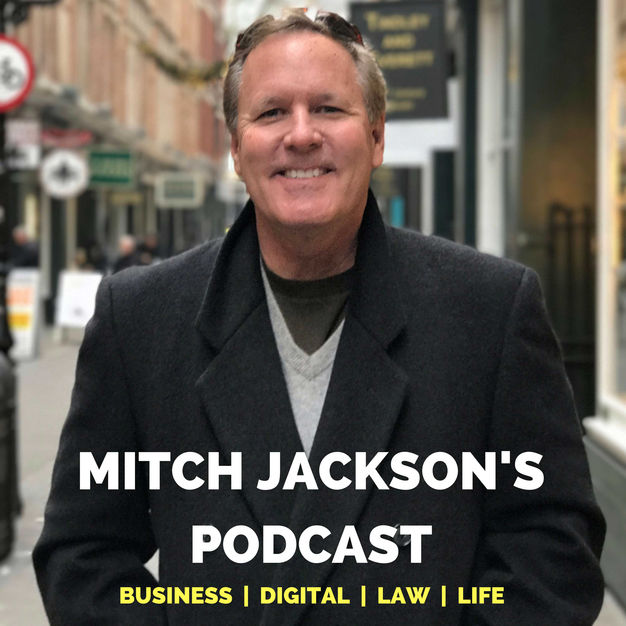
Mitch Jackson's Podcast
Mitch Jackson: Lawyer, Tech Entrepreneur, Law Disrupter
Mitch Jackson shares three decades of battle-tested business, entrepreneur, digital, and legal tips, to help you build relationships, top-of-mind awareness, and safely do business on the digital platforms. He also enjoys sharing conversations with amazing people from around the world who are disrupting industries and creating positive global change.
- 7 minutes 24 secondsMost Lawyers Are Looking at AI All Wrong
This episode dives into a critical question: how can lawyers use AI to not just work faster, but to elevate their client experience? Join us as we shift the focus from speed and accuracy to what really matters—creating trust, delivering clarity, and anticipating client needs.
From clear communication and personalized service to proactive problem-solving, this podcast explores the five things clients expect most in 2025. Drawing on 30+ years of legal expertise and real-world insights, Mitch wrote this week's LinkedIn newsletter issue adressing the topics discussed in this episode. In less than 5 minutes you'll see how to blend cutting-edge technology with the human touch that sets great lawyers apart.
Whether you’re an attorney or just curious about how AI is reshaping client expectations, this is the conversation you don’t want to miss.
The related written article is here https://www.linkedin.com/pulse/most-lawyers-looking-ai-all-wrong-mitch-jackson-xgp9c/?trackingId=sT%2BIXBu1SeOER9PvHOeBMw%3D%3D
Past podcast episodes are here https://mitch-jackson.com/podcast
15 January 2025, 10:51 pm - 5 minutes 30 secondsAI and the Art of Connection: Revolutionizing Communication and Engagement
This episode advocates for using AI tools to enhance communication and audience engagement. It highlights AI-powered applications like Perplexity for interactive podcasts and NotebookLM for transforming content into engaging audio dialogues.
The author emphasizes that the communicator's role is shifting from simply delivering information to strategically shaping intent. AI tools like Google AI Studio are presented as valuable resources for analyzing and improving communication effectiveness across various platforms, ultimately helping communicators refine their message and resonate more deeply with their audience. The integration of AI and traditional storytelling is proposed as a key to impactful communication.
Book link on Amazon https://a.co/d/1YsFrMm
Connect with Mitch https://linktr.ee/mitchjackson
Past episodes https://mitch-jackson.com/podcast
8 January 2025, 5:10 pm - 14 minutes 48 secondsDAO Spending and Investment Agreements: Securing Accountability and Preventing Misuse
This episode discusses the importance of legally sound agreements for Decentralized Autonomous Organizations (DAOs). Jackson advocates for a comprehensive agreements which he calls "DAO Fund Distribution Agreement" to ensure accountability and prevent misuse of funds when DAOs distribute money to third parties.
The proposed agreement includes clauses addressing purpose, monthly accounting, audit rights, reporting standards, milestones, transparency, dispute resolution, termination, governing law, and indemnification. Jackson emphasizes the critical role of written agreements in protecting all parties involved in DAO transactions and promoting project sustainability.
Read the original article this conversation was based upon here https://www.linkedin.com/posts/mitchjackson_dao-spending-and-investment-agreements-securing-activity-7282419031444205569-tpG9?utm_source=share&utm_medium=member_desktop
Listen to past episodes of this podcast here https://mitch-jackson.com/podcast
8 January 2025, 2:00 pm - 17 minutes 50 secondsA conversation about Mitch's first children's book, Little Heroes
Enjoy this overview of my first children's book, "Little Heroes- Big tips for bright futures." It's FREE and packed with grown-up success tips for 6-10 year-olds.
It offers bite-sized ideas, simple enough to spark curiosity, with audio chapters that work perfectly for car rides or bedtime (even if mom or dad falls asleep first).
Why is this episode shared here in the AI in Law Podcast?
The answer is easy. Mitch used AI to help pull content from his popular new book, Power Moves, and then asked AI to help him rewrite these favorite lessons for kids. The artwork in each chapter is was created using Midjourney (AI) and the podcast episodes of each chapter using Eleven Labs (AI).
We think the end result is great and it was fun leveraging AI to do the book project. Also please keep in mind that we'll be adding 5-10 new written and audio chapters in the near future.
The written book and audio podcast versions are here https://mitch-jackson.com/little-heroes/
Power Moves and other books written by Mitch are here https://mitchjackson.xyz
Past podcast episodes are here https://mitch-jackson.com/podcast
7 January 2025, 12:23 am - 10 minutes 29 secondsVirtual Reality and False Memories Discussed
Virtual reality (VR) is revolutionizing how we remember and experience information, impacting business and law significantly. VR's ability to create realistic memories raises ethical concerns, as it can be used to manipulate perceptions in marketing or influence legal proceedings.
This episode explores the potential for false memories induced by VR and the consequent legal and ethical implications, particularly in the courtroom where the reliability of VR-generated memories is questioned.
Businesses must consider liability related to using VR for marketing or training, and the legal system faces challenges in distinguishing genuine from artificially-created memories. Ultimately, the text emphasizes the need for responsible VR implementation, guided by ethical frameworks and regulations.
Past episodes here https://mitch-jackson.com/podcast
Read the newsletter issue (with related video links) focusing on this topic: https://www.linkedin.com/pulse/vrs-impact-memory-ethics-mitch-jackson-4fewc/?trackingId=wWnqlx0mQ3SEFruyRn5RVA%3D%3D
6 January 2025, 11:18 pm - 25 minutes 33 secondsThe Web3, Metaverse, and AI Handbook (free 2025 update)The Web3, Metaverse, and AI Handbook
This free and updated (2025) handbook provides a comprehensive overview of Web3, the metaverse, and artificial intelligence, explaining each technology's functionalities and potential applications for businesses and individuals. The authors, Garrett and Mitch Jackson, professionals with decades of combined extensive experience in law, business, and technology, offer a practical, accessible guide, emphasizing the transformative impact of these technologies.
The book utilizes AI in its creation and provides access to a custom AI agent to answer reader questions. Specific chapters explore decentralization, blockchain, smart contracts, digital artifacts, DAOs, DApps, cryptocurrency, digital wallets, DeFi, tokenization, metaverse spaces, VR headsets, digital identity, and the ethical considerations of AI. The authors conclude by discussing the future implications and potential risks associated with these technologies, highlighting the importance of due diligence and inclusivity.
Read and share the free 2025 update here https://mitchjackson.xyz/8/web3
Also see "How To Create AI, Web3 and Metaverse Branding and Licensing Opportunities" https://mitchjackson.xyz/7/licensing
29 December 2024, 5:21 pm - 13 minutes 20 secondsAI and the Art of the Possible: A Vision for Business Owners
Let’s start with a truth bomb: Artificial Intelligence isn’t just a tool to check off tasks faster or churn out work more efficiently. That’s the surface level. The real magic of AI lies in its ability to unlock possibilities that were once invisible. It’s not about faster workflows or better productivity—that’s table stakes. It’s about opening doors to opportunities your competitors haven’t even thought to look for, let alone walk through. This isn’t just about lawyers, coffee shop owners, or entrepreneurs; it’s about every single business owner willing to rethink what’s possible.
Think about this: AI isn’t a crutch—it’s a catalyst. And if you’re willing to harness it, you can redefine the game, not just play it better.
Moving Beyond the Checklist
Most people approach AI like they would a shiny new gadget—something that speeds up processes or automates repetitive tasks. Sure, that’s useful. But stopping there is like owning a Ferrari and never driving it out of first gear. AI isn’t just here to help you do old things faster; it’s here to help you imagine—and accomplish—things you never dreamed possible.
Take lawyers as an example. AI can churn through thousands of contracts in minutes, pulling relevant clauses and spotting red flags. Impressive? Absolutely. But let’s take it further. Imagine preparing for a high-stakes trial where AI doesn’t just deliver precedents—it analyzes the tendencies of judges, the historical strategies of opposing counsel, and even trends in how specific arguments have fared in courtrooms across decades. That’s not working smarter; that’s rewriting the rulebook.
And this isn’t just for law firms. If you’re a retailer, AI can dig through years of purchasing data to uncover the reason customers are choosing the competition. If you’re a coffee shop owner, it’s not just about optimizing your Instagram captions; it’s about discovering that your community craves live music on Thursday nights or faster Wi-Fi for remote work sessions. The data is already out there. AI just makes it accessible—and actionable.
The Death of Linear Thinking
Traditional business thinking is linear: Step one leads to step two, then step three. It’s logical, predictable, and comfortable. But let’s face it: Comfort is the enemy of innovation. AI doesn’t think in straight lines. It connects seemingly unrelated dots, drawing insights from vast oceans of data in ways that humans simply can’t.
For example, imagine you’re an entrepreneur launching a new product. Instead of focusing solely on demographic surveys or market research reports, AI dives into customer reviews, social media chatter, and even local search queries. Suddenly, you’re not just identifying trends—you’re predicting them. Linear thinking? That’s yesterday’s news. AI gives you exponential thinking, where the possibilities multiply with every new input.
Permission to Dream Big
Here’s where most business owners get stuck: They see AI as a tool for efficiency, not imagination. That’s a mistake. AI isn’t about replacing human creativity—it’s about amplifying it. It’s the ultimate paintbrush, and you’re the artist. The question isn’t, “What can AI do for me?” It’s, “What can I dream up with AI as my partner?”
Let’s say you’re running a boutique hotel. AI can analyze guest feedback and local travel trends, helping you identify that what your clientele really wants isn’t just a comfortable bed—it’s a curated experience, like guided sunrise hikes or personalized dining recommendations. That’s not just meeting expectations; that’s redefining them. The same applies to every industry. AI doesn’t limit your creativity; it unleashes it.
The Human Element Still Matters
Here’s the reality check: AI can process mountains of data in seconds, but it can’t shake someone’s hand, build trust, or truly understand what it’s like to stand in your customer’s shoes. That’s your job. And the more you lean into the human side of your business, the more valuable AI becomes.
Think of it this way: AI can tell you what your audience wants before they even know they want it. But only you can deliver it in a way that feels personal, empathetic, and genuine. Whether you’re crafting a compelling legal argument, brewing the perfect cappuccino, or launching a new product, AI isn’t replacing the human touch—it’s making it more essential than ever.
The Bigger Picture
At its core, AI isn’t just a productivity tool; it’s a permission slip to dream bigger. It’s the nudge that says, “Why stop at doing things better when you can do things differently?” For lawyers, it’s predicting disputes before they arise. For business owners, it’s uncovering markets that no one else sees. For coffee shop owners, it’s creating a space so tailored to your community that it becomes a destination.
The future belongs to those willing to ask bold questions—and let AI help answer them. Why settle for incremental progress when you could be reinventing the game? AI isn’t here to do your job for you; it’s here to make your job limitless. So go ahead: Dream bigger, push further, and use AI to not just improve your business, but to reimagine it entirely. Because in this new era, the only limit is your imagination. Mitch Stay connected https://linktr.ee/mitchjackson
29 December 2024, 4:19 pm - 42 minutes 34 secondsNew Ideas: How To Create AI, Web3 and Metaverse Branding and Licensing Opportunities
🎙️ Unlocking Revenue in the New Digital Frontier 🎧
Imagine a world where your ideas don’t just inspire—they generate income in entirely new ways. That’s the power of AI, Web3, and the metaverse, and in this episode, we’re diving deep into how licensing in these spaces is creating unprecedented opportunities for creators, brands, and visionaries.
This isn’t just about technology—it’s about turning your creativity into a sustainable, scalable business. From NFTs as perpetual revenue streams to virtual avatars representing your brand worldwide, licensing is the bridge between innovation and income.
🔑 In this episode, you’ll learn:
• How to leverage AI to develop marketable ideas, content, and products that can be licensed globally.
• Why Web3 isn’t just a buzzword—it’s a revolutionary way to take ownership of your brand and its future profits.
• How the metaverse is opening new arenas for licensing deals, from virtual concerts to branded digital wearables.
We’ll break down the complexity and show you actionable ways to monetize your creativity, no matter where you’re starting from. Whether you’re an artist, entrepreneur, or influencer, this episode is packed with strategies to transform your ideas into assets and your assets into income.
💡 Get inspired by real-world examples, like artists earning royalties through NFTs, brands creating immersive experiences in the metaverse, and influencers licensing virtual personas.
The future of entertainment and commerce is wide open. Are you ready to claim your slice of this multi-billion-dollar frontier? Plug in, take notes, and start building your next revenue stream today. Let’s unlock the full potential of licensing in the digital age—because your creativity deserves to thrive.
______
Read the book here https://mitchjackson.xyz/7/licensing
Past episodes at https://mitch-jackson.com/podcast
22 December 2024, 8:27 pm - 23 minutes 27 secondsMitch's new book, "Legal Tips for Creators"
Legal Tips for Creators: Protecting and Profiting From Your Work
Creativity is the soul of innovation. Whether you’re a writer, an artist, a filmmaker, or someone sketching the next big idea on the back of a napkin, your creations reflect who you are. But here’s the hard truth: no matter how brilliant your work is, its future depends on the legal safeguards you build around it.
That’s why today’s episode is all about “Legal Tips for Creators.” We’re diving into the stories, strategies, and solutions found in my new book, where I’ve packed 30 years of experience into practical, actionable advice just for creators like you.
This isn’t your typical legal lecture. Think of it as a conversation—a roadmap to help you navigate contracts, copyrights, trademarks, and even emerging challenges like AI-generated content. This episode is your chance to learn how to not only protect your work but also to thrive in a world full of opportunities and potential pitfalls.
We’ll tackle the myths, uncover the realities, and share tools that will empower you to protect your passion without drowning in legalese. Because when you know your rights, you’re free to dream bigger, create freely, and take your work to the next level.
So grab your coffee, settle in, and let’s explore what every creator needs to know to secure their creative future.
Read "Legal Tips for Lawyers" here https://mitchjackson.xyz
Listen to past episodes here https://mitch-jackson.com/podcast
21 December 2024, 2:31 am - 13 minutes 42 secondsBeyond the Crypto Hype: What Traditional Finance Gets Right That Digital Currency Doesn’t
In this episode, we’re diving into a conversation that cuts through the hype of cryptocurrency and uncovers the invisible safety nets of traditional finance. While crypto captures headlines with promises of decentralization and innovation, fiat currency quietly provides crucial protections—like fraud prevention, deposit insurance, and stability—that most people don’t even realize they rely on. We’ll break down the top 10 ways fiat keeps your money safe and explore the very real vulnerabilities of an unregulated crypto world. If you’ve ever wondered what you’re risking by chasing the blockchain buzz, this episode is for you.
Read the full article here https://www.linkedin.com/posts/mitchjackson_my-new-post-beyond-the-crypto-hype-what-activity-7275177984544677889-MKBK?utm_source=share&utm_medium=member_desktop
Past episodes here https://mitch-jackson.com/podcast
Connect with Mitch on Bluesky https://bsky.app/profile/mitch.social
18 December 2024, 6:24 pm - 33 minutes 48 secondsMy New Book: “Power Moves: Battle-Tested Strategies from the Business Trenches”
Power Moves: Wisdom That Works
Guess what? My new book, “Power Moves: Battle-Tested Strategies from the Business Trenches” is finally here. Think of it as 30 years of lessons boiled down into one sharp, practical guide—perfect for navigating both business and life with confidence.
This isn’t the kind of playbook you’d find in a classroom. Nope, this is real-life stuff, forged in the fires of sleepless nights, high-stakes deals, and the occasional misstep that taught me more than any win ever could. Some insights come from the generous wisdom of mentors, others from books I couldn’t put down. And a few? Let’s just say they were earned the hard way.
The best part? The book grows with you. Flip straight to “N” for negotiation tips or “L” if leadership’s on your mind. No rules, no rigid structure—just tools to help you carve your own success story.
Here’s the kicker: success isn’t some mystical formula or a lucky break. It’s about mindset, smart strategies, and loving the grind just as much as the goal. Ready to dive in?
And hey, this one’s on me. No email sign-ups, no strings—just a free read, 24/7, at this link.
The main book shelf is https://mitchjackson.xyz and the direct link to this book is https://mitchjackson.xyz/5/powermoves
It’s my way of saying “thank you” for an amazing 2024.
Enjoy!
Mitch
13 December 2024, 4:42 pm - More Episodes? Get the App
Your feedback is valuable to us. Should you encounter any bugs, glitches, lack of functionality or other problems, please email us on [email protected] or join Moon.FM Telegram Group where you can talk directly to the dev team who are happy to answer any queries.
 Livestream Universe Update (Audio)
Livestream Universe Update (Audio)
 Leaders Love Company
Leaders Love Company
 Ross & Nez: The Livestream Experience (Audio)
Ross & Nez: The Livestream Experience (Audio)
 Clienting
Clienting